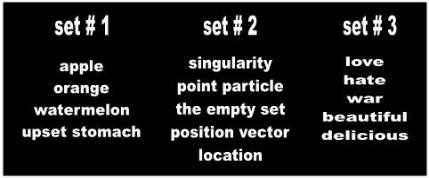A point is sometimes defined as an element of a set, but, as the reader may realize by now, this attempt
at defining the word point results in circular definitions:
- “ point: An element in a geometrically described set.” [1]
“ Mathematical points, however, can be defined without reference to a metric. They are
just elements of a set, usually called a ‘space’.” (p. 1299) [2]
“ A set is a finite or infinite collection of objects…Members of a set are often referred to
as elements…” [3] (where an object is defined as “a mathematical structure” ) [4]
- “ an element (also called a member) is an object contained in a set” [5]
“ object: a thing, being or concept” [6]
“ If X is a member of a set A, then X is said to be an element of A... The term element also
refers to a particular member of a group” [7]
[Awesome, man! This stuff’s deep!]
Therefore, a set is a collection of elements and an element is a member of a set. Great! (It's absolutely
stunning what you learn in Mathematical Physics these days!)
Let's test the proposal of the mathematicians. We have the event anger (which happened to me
yesterday a 9:30 when I was reading something about relativity). The religion of Mathematical Physics
allows us to replace this feeling with a dot known as a point. We do this successively with other
concepts and events and end up with a list of points or elements or whatever. So now this particular
mathematical collection includes love, anger, hate, upset stomach, and headache (Fig. 1). What have
we learned?
| The 'element-of-a-set' point |
Fig. 1 High level Math The elements of a set |
| Adapted for the Internet from: Why God Doesn't Exist |
I have no problems with mathematicians babbling about sets and 'element' points in their asylums. I
have a problem when the autistic nerd attempts to convince me that this garbage has something to
do with Physics. I have problems when these retards say that physical interpretations follow from
variables, equations, and functions.
Actually, I should have more tolerance… After all, these people are mental patients.
Of course, you should always read the fine print before signing the contract. Mathematical physicists
are famous for disclaiming everything at the end of their presentations or with casual footnotes. In
fact, they open the umbrella before the questions from the press rain down on them:
- “ Like the concepts of point and line in Euclidean geometry, in mathematics, the
terms ‘set’ and ‘set membership’ are fundamental objects used to define other
mathematical objects, and so are not themselves formally defined.” [8]
“ What does it mean to define a mathematical concept? ...they are artificial construc-
tions which are useful from the point of view of providing mathematics with solid
foundations... ” [How solid? I mean, can I build a house with these bricks?]
However, that is largely where their usefulness ends, and one should not make the
silly mistake of thinking that they somehow reveal the ‘true essence’ of the concept
being defined. This would be too obvious to be worth mentioning were it not for the
fashion of introducing these definitions as though they were at last uncovering such
an essence” [9]
Questions anyone?
- Module main page: What's the point, Euclid?
Pages in this module:
- 1. The primitive point
2. Euclid's 'no part' point
3. The infinitesimal point
4. The ordered pair point
5. The node point
6. The center-of-mass point
7. This page: The 'element of a set' point
| Elemental Bill an element of a set, the set of 'split in two' |


- ________________________________________________________________________________________
- Copyright © by Nila Gaede 2008
